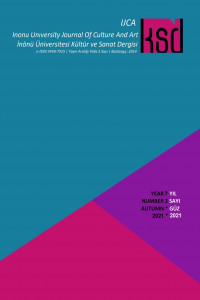Öz
Bu araştırma Türkiye’de üniversitelerin müzik bölümlerinde yürütülen ses eğitimi dersinde eşlik çalgısı olarak tercih edilen piyano yerine, ulusa özgü repertuvarın makamsal yapısına uygun olan, aynı zamanda vokal icrayı destekleyen Türk müziği çalgılarının tercih edilmesinin bireylerin gelişimine ve Türk müziğine katkılarının değerlendirilmesi amacıyla gerçekleştirilmiştir. Araştırmada, tarama yöntemi kullanılmış, konuyla ilgili verilerin toplanılması amacıyla kaynak taraması (literatür, internet) yapılmıştır. Araştırmada elde edilen bulgular doğrultusunda, eğitim, opera, Türk halk müziği, Türk sanat müziği alanında uzman ses ve çalgı icracıları, akademisyenler ve KBB alan uzmanı doktorların bir araya getirileceği akademik toplantılar aracılığıyla ulusa özgü temel ve ileri düzeydeki öğeler ile tekniklerin belirlenip, ses eğitiminde kazandırılması gereken davranışların net olarak ortaya konulmasının önemli olduğu sonucuna ulaşılmıştır. Araştırma sonucunda elde edilen verilerin çözümlenmesinde betimsel analiz yöntemi kullanılmıştır. Ulusa özgü ses eğitimi programının, ancak milli felsefe konusunun anlaşıldığı zaman mümkün olabileceği düşünülmektedir. Kültürel açıdan bakabilmek için bu coğrafyanın felsefi düşüncesini, düşünürlerini, bestekârlarını, icracılarını tanımanın, onların sanata, hayata, kültüre ve müziğe bakışlarının anlaşılmasının önemli olduğu düşünülmektedir. Ayrıca günümüzde Covid-19 küresel salgın nedeniyle online olarak gerçekleşen eğitimde yaşanan senkron gibi bazı problemler ses eğitiminde teknolojinin sunduğu olanaklardan faydalanılması ve bu alanda materyallerin oluşturulması konularını da gündeme getirmiştir. Ses eğitimi alan uzmanları, teknoloji alan uzmanlarıyla ortak çalışmalar yaparak faydalı materyaller oluşturabilirler.
Anahtar Kelimeler
Ses eğitimi piyano eşliği kültür Türk müziği Türk müziği çalgıları
Kaynakça
- Türkmen, E. Funda (2012). Kültürler Arası İlişkilerde Müziğin Rolü ve Önemi “Karol Szymanowskı’de Anadolu İzleri”, Qualıtatıve Studıes, ISSN:1306-3111, e-Journal of New World Sciences Academy, April 2012, Volume: 7, Number: 2, Article Number: E0014.
- Öner, A., Sevinç, S. (2020). Kâr-ı Nâtık Temelli Makam Alıştırmalarının Türk Müziği Ses Eğitiminde Kullanılabilirliğinin Değerlendirilmesi, ASED | Aksaray Üniversitesi Sosyal Bilimler Enstitüsü Dergisi, Yıl: 2020 (Haziran) / Cilt: 4 / Sayı:1 ISSN: 2619-9211.
- Otacıoğlu, S. (2020). Ses Eğitiminde Register Algısı. Atatürk Üniversitesi Sosyal Bilimler Enstitüsü Dergisi, 24 (3) , 1295-1311.
- Ay, G. (13 Şubat 2021) “Müzik ve Devlet Politikası” MÜZDAK, Müzik Çalıştayı, İstanbul. (Yer: Zoom).
- Ekmen, G. (14 Şubat 2021) “Türk Müziği Eğitimi ve Felsefe” MÜZDAK, Müzik Çalıştayı, İstanbul. (Yer: Zoom).
- Yükrük, H. (14 Şubat 2021) "Bağlamada Yöresel Tezene Tavırları" MÜZDAK, Müzik Çalıştayı, Van. (Yer: Zoom).
- Önaldı, Ş. (14 Şubat 2021) “THM’de; Üslup, Tavır ve Yorum” MÜZDAK, Müzik Çalıştayı, İstanbul. (Yer: Zoom).
- URL-1: Yücelen, E. (Vocal Coach) (2018), Biz Müziği Ağlama ile Öğrendik! Yörelere Göre Nağmeler! Sanatçı Oğuz Aksaç [Program Konuğu], ‘Emre Yücelen Şan Dersi’ [Youtube Kanalı], https://www.youtube.com/watch?v=D-XRmhXwJoA (Erişim Tarihi: 18.04.2021).
Öz
This study was made with the aim of evaluating the contributions of Turkish music instruments which are in accordance with the modal form of the national repertoire and which also support vocal performance, instead of the piano, which is preferred as the accompaniment instrument during the vocal training lessons of the music departments of the universities in Turkey, to the development of individuals and to Turkish music. In the study, scanning method was used and literature review (literature, the Internet) was made with the intent of gathering data related to the subject. In line with the data obtained in the study, it was concluded to be important that through academic meetings in which expert vocal and instrumental performers in the fields of education, opera, Turkish folk music, Turkish classical music, academicians and ENT doctors will come together, basic and advanced national elements and methods must be identified and that the conducts to be taught in vocal training must be clearly presented. In analysing the data obtained as a result of the research, descriptive analysis method was used. It is considered that national vocal training program can only regarded possible when national philosophy is understood well. In order to be able to examine culturally, it is thought that knowing the philosophical ideology, thinkers, composers and performers of this land and how they consider art, life, culture and music is significant. Furthermore, some problems such as synchronicity experienced during online education, which has to be preferred because of the pandemic nowadays, makes it a current matter to make better use of the opportunities provided by technology and to produce materials in this field. Field experts of vocal training can produce useful materials via cooperation with field experts of technology.
Anahtar Kelimeler
Vocal training piano cccompaniment culture Turkish music Turkish music instruments.
Kaynakça
- Türkmen, E. Funda (2012). Kültürler Arası İlişkilerde Müziğin Rolü ve Önemi “Karol Szymanowskı’de Anadolu İzleri”, Qualıtatıve Studıes, ISSN:1306-3111, e-Journal of New World Sciences Academy, April 2012, Volume: 7, Number: 2, Article Number: E0014.
- Öner, A., Sevinç, S. (2020). Kâr-ı Nâtık Temelli Makam Alıştırmalarının Türk Müziği Ses Eğitiminde Kullanılabilirliğinin Değerlendirilmesi, ASED | Aksaray Üniversitesi Sosyal Bilimler Enstitüsü Dergisi, Yıl: 2020 (Haziran) / Cilt: 4 / Sayı:1 ISSN: 2619-9211.
- Otacıoğlu, S. (2020). Ses Eğitiminde Register Algısı. Atatürk Üniversitesi Sosyal Bilimler Enstitüsü Dergisi, 24 (3) , 1295-1311.
- Ay, G. (13 Şubat 2021) “Müzik ve Devlet Politikası” MÜZDAK, Müzik Çalıştayı, İstanbul. (Yer: Zoom).
- Ekmen, G. (14 Şubat 2021) “Türk Müziği Eğitimi ve Felsefe” MÜZDAK, Müzik Çalıştayı, İstanbul. (Yer: Zoom).
- Yükrük, H. (14 Şubat 2021) "Bağlamada Yöresel Tezene Tavırları" MÜZDAK, Müzik Çalıştayı, Van. (Yer: Zoom).
- Önaldı, Ş. (14 Şubat 2021) “THM’de; Üslup, Tavır ve Yorum” MÜZDAK, Müzik Çalıştayı, İstanbul. (Yer: Zoom).
- URL-1: Yücelen, E. (Vocal Coach) (2018), Biz Müziği Ağlama ile Öğrendik! Yörelere Göre Nağmeler! Sanatçı Oğuz Aksaç [Program Konuğu], ‘Emre Yücelen Şan Dersi’ [Youtube Kanalı], https://www.youtube.com/watch?v=D-XRmhXwJoA (Erişim Tarihi: 18.04.2021).
Ayrıntılar
| Birincil Dil | Türkçe |
|---|---|
| Bölüm | Araştırma Makalesi |
| Yazarlar | |
| Erken Görünüm Tarihi | 29 Aralık 2021 |
| Yayımlanma Tarihi | 29 Aralık 2021 |
| Yayımlandığı Sayı | Yıl 2021 Cilt: 7 Sayı: 2 |
https://dergipark.org.tr/tr/pub/ijca


